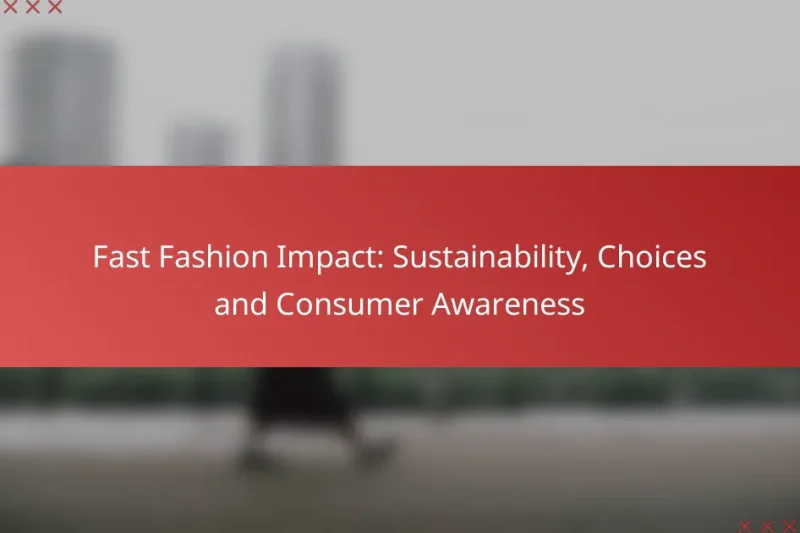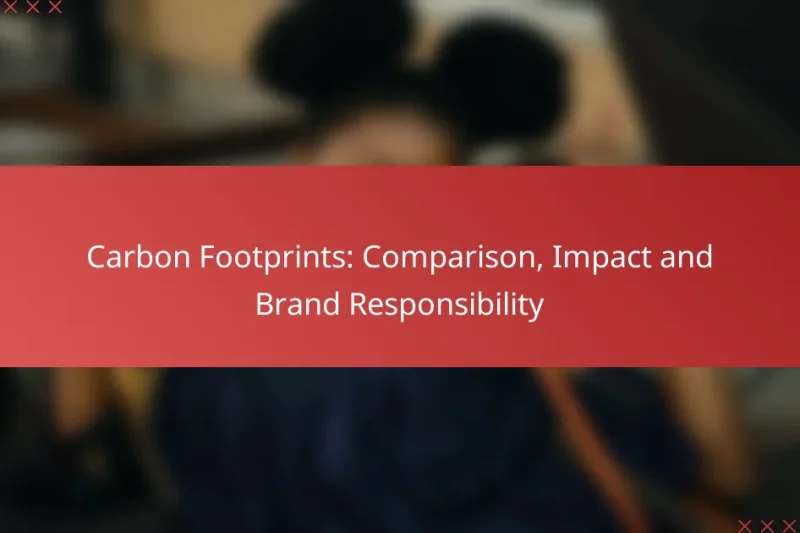Sustainable streetwear brands are redefining fashion by merging eco-friendly practices with contemporary style. With options like … Sustainable Streetwear Brands: Quality, Style and AffordabilityRead more
Sustainability Practices in Streetwear
Sustainability practices in streetwear are becoming increasingly vital as brands seek to minimize their environmental impact while appealing to conscious consumers. By integrating eco-friendly materials and ethical production methods, streetwear labels can foster brand loyalty and differentiate themselves in a competitive market. Leading brands like Patagonia and Stella McCartney exemplify how sustainable strategies can enhance both reputation and environmental responsibility.
Consumer Trends: Preferences, Behaviors and Sustainability
In recent years, consumer trends have shifted significantly towards sustainability, with shoppers increasingly favoring eco-friendly products … Consumer Trends: Preferences, Behaviors and SustainabilityRead more
Fast Fashion Impact: Sustainability, Choices and Consumer Awareness
Fast fashion poses a significant threat to sustainability, particularly in the UK, by encouraging rapid production … Fast Fashion Impact: Sustainability, Choices and Consumer AwarenessRead more
Sustainable Practices: Identification, Metrics and Compliance
Sustainable practices are essential for businesses aiming to minimize their environmental impact while enhancing operational efficiency. … Sustainable Practices: Identification, Metrics and ComplianceRead more
Carbon Footprints: Comparison, Impact and Brand Responsibility
Carbon footprints play a crucial role in assessing the environmental impact of brands, as they reflect … Carbon Footprints: Comparison, Impact and Brand ResponsibilityRead more
Eco-Friendly Materials: Types, Benefits and Sourcing
Eco-friendly materials play a crucial role in sustainable construction, offering options like bamboo, recycled steel, and … Eco-Friendly Materials: Types, Benefits and SourcingRead more
Informed Choices: Criteria, Benefits and Brand Transparency
Informed choices in e-commerce are crucial for consumers seeking to make responsible purchasing decisions. By evaluating … Informed Choices: Criteria, Benefits and Brand TransparencyRead more
How can streetwear brands adopt sustainable practices?
Streetwear brands can adopt sustainable practices by integrating eco-friendly materials, reducing waste, and collaborating with responsible suppliers. These strategies not only minimize environmental impact but also appeal to increasingly conscious consumers.
Use of organic materials
Utilizing organic materials is a fundamental step for streetwear brands aiming for sustainability. Organic cotton, hemp, and linen are excellent alternatives to conventional fabrics, as they are grown without harmful pesticides and fertilizers. Brands should seek certifications like GOTS (Global Organic Textile Standard) to ensure authenticity.
Incorporating organic materials can also enhance brand image, as consumers are more likely to support brands that prioritize environmental health. Transitioning to organic options may involve higher costs initially, but the long-term benefits often outweigh these expenses.
Implement recycling programs
Implementing recycling programs allows streetwear brands to minimize waste and promote circular fashion. Brands can set up take-back schemes where customers return old garments for recycling or repurposing. This not only reduces landfill contributions but also fosters customer loyalty.
To make recycling effective, brands should educate consumers on how to properly recycle their products. Collaborating with local recycling facilities can streamline the process and ensure that materials are effectively reused.
Reduce water consumption
Reducing water consumption is crucial for sustainable streetwear production. Brands can adopt techniques such as waterless dyeing or using recycled water in manufacturing processes. This significantly lowers the overall water footprint associated with garment production.
Additionally, brands can encourage consumers to wash clothes less frequently and at lower temperatures, which conserves water and energy. Simple messaging on care labels can help promote these practices effectively.
Partner with eco-friendly suppliers
Partnering with eco-friendly suppliers is essential for streetwear brands committed to sustainability. Brands should evaluate their supply chain and choose suppliers that adhere to sustainable practices, such as using renewable energy and ethical labor standards. This collaboration can enhance transparency and accountability within the brand.
Establishing strong relationships with eco-conscious suppliers can also lead to innovative materials and processes that further reduce environmental impact. Regular audits and assessments can ensure that suppliers maintain their sustainability commitments.
Utilize sustainable packaging
Utilizing sustainable packaging is a straightforward way for streetwear brands to reduce their environmental footprint. Brands can opt for biodegradable, recyclable, or reusable packaging materials that minimize waste. This not only benefits the environment but also resonates with eco-conscious consumers.
Brands should also consider reducing packaging size and weight to lower transportation emissions. Clear communication about packaging choices can enhance brand loyalty and attract consumers who prioritize sustainability in their purchasing decisions.
What are the benefits of sustainability in streetwear?
Sustainability in streetwear offers numerous advantages, including fostering brand loyalty, attracting eco-conscious consumers, and enhancing market differentiation. By adopting sustainable practices, brands can not only improve their reputation but also contribute positively to the environment.
Improved brand loyalty
Brands that prioritize sustainability often see increased loyalty from their customers. Consumers are more likely to support companies that align with their values, especially regarding environmental responsibility. This loyalty can translate into repeat purchases and positive word-of-mouth.
To build brand loyalty through sustainability, companies should communicate their practices transparently. Sharing stories about sourcing materials, ethical labor practices, and environmental impact can strengthen the connection with consumers.
Attract environmentally conscious consumers
Eco-conscious consumers actively seek out brands that demonstrate a commitment to sustainability. By adopting eco-friendly materials and production methods, streetwear brands can tap into this growing market segment. This demographic often prioritizes quality and ethical considerations over price.
To attract these consumers, brands should highlight their sustainable initiatives in marketing campaigns. Using certifications like Global Organic Textile Standard (GOTS) or Fair Trade can further validate their efforts and appeal to this audience.
Enhanced market differentiation
In a crowded streetwear market, sustainability can serve as a key differentiator. Brands that emphasize their eco-friendly practices can stand out from competitors who do not prioritize sustainability. This unique selling proposition can attract attention and drive sales.
To effectively differentiate, brands should focus on innovative sustainable practices, such as using recycled materials or implementing circular fashion concepts. Creating limited-edition collections that emphasize these practices can also generate buzz and attract new customers.
Which streetwear brands are leading in sustainability?
Several streetwear brands are at the forefront of sustainable practices, focusing on eco-friendly materials and ethical production methods. Notable leaders include Patagonia, Allbirds, Reformation, and Stella McCartney, each implementing unique strategies to minimize their environmental impact.
Patagonia
Patagonia is renowned for its commitment to environmental sustainability, using recycled materials and organic cotton in its products. The brand promotes a repair and reuse culture, encouraging customers to fix rather than discard their clothing.
Additionally, Patagonia donates a percentage of its profits to environmental causes and actively engages in activism, making it a model for responsible business practices in the streetwear industry.
Allbirds
Allbirds focuses on creating footwear from natural materials, such as merino wool and eucalyptus tree fibers. The brand emphasizes transparency in its supply chain and has a goal of achieving carbon neutrality across its products.
Allbirds also provides a carbon footprint label on its shoes, allowing consumers to make informed decisions about their purchases and encouraging other brands to follow suit.
Reformation
Reformation is dedicated to sustainable fashion, offering stylish clothing made from eco-friendly fabrics like Tencel and recycled materials. The brand tracks its environmental impact and shares this information with customers, promoting a conscious consumer mindset.
Reformation also implements a take-back program, allowing customers to return old garments for recycling, thus reducing waste and extending the lifecycle of clothing.
Stella McCartney
Stella McCartney is a pioneer in luxury sustainable fashion, refusing to use leather or fur in her collections. The brand prioritizes innovative materials, such as vegan leather and organic cotton, to minimize environmental harm.
Stella McCartney also advocates for animal rights and sustainable practices within the fashion industry, setting high standards for ethical production and encouraging other designers to adopt similar practices.
What certifications should sustainable streetwear brands pursue?
Sustainable streetwear brands should consider certifications that validate their commitment to ethical and eco-friendly practices. Key certifications include Global Organic Textile Standard (GOTS), OEKO-TEX Standard 100, and Fair Trade Certification, each focusing on different aspects of sustainability and ethical production.
Global Organic Textile Standard (GOTS)
The Global Organic Textile Standard (GOTS) is a leading textile processing standard for organic fibers. It ensures that textiles are made from at least 70% organic natural fibers and that the entire production process, from harvesting to labeling, adheres to strict environmental and social criteria.
Brands seeking GOTS certification must demonstrate compliance with criteria related to water use, chemical management, and fair labor practices. This certification not only enhances brand credibility but also appeals to environmentally conscious consumers.
OEKO-TEX Standard 100
OEKO-TEX Standard 100 is a globally recognized certification that tests textiles for harmful substances. Products certified under this standard are verified to be free from chemicals that could pose health risks to consumers.
For streetwear brands, obtaining OEKO-TEX certification can be a strong selling point, as it assures customers that the clothing is safe to wear. Brands should regularly update their certifications to reflect ongoing compliance with the latest safety standards.
Fair Trade Certification
Fair Trade Certification focuses on ensuring fair wages and safe working conditions for producers in developing countries. This certification promotes sustainable livelihoods and empowers workers by providing them with a fair price for their products.
Streetwear brands pursuing Fair Trade Certification should engage directly with producers and ensure transparency in their supply chains. This not only enhances brand reputation but also fosters consumer trust, as customers increasingly seek ethically produced clothing.
How do consumers evaluate sustainable streetwear?
Consumers evaluate sustainable streetwear based on transparency, materials used, and ethical production practices. Key factors include the brand’s commitment to eco-friendly materials, fair labor practices, and overall environmental impact.
Transparency in sourcing and production
Transparency is crucial for consumers assessing sustainable streetwear. Brands that openly share information about their supply chains and production processes tend to build trust with their customers. Look for brands that provide details on where materials are sourced and how garments are made.
Many consumers prefer brands that can trace their materials back to responsible sources. Certifications such as GOTS (Global Organic Textile Standard) or Fair Trade can indicate a commitment to ethical practices.
Materials and their environmental impact
The materials used in streetwear significantly influence its sustainability. Organic cotton, recycled polyester, and Tencel are popular choices that minimize environmental harm. Brands that utilize these materials often appeal to eco-conscious consumers.
When evaluating streetwear, consider the lifecycle of the materials. For example, garments made from recycled materials can reduce waste and lower carbon footprints. Consumers should also be aware of the durability of materials, as longer-lasting items contribute to sustainability.
Ethical labor practices
Ethical labor practices are a key component of sustainable streetwear. Consumers increasingly seek brands that ensure fair wages and safe working conditions for their workers. Brands that are certified by organizations like Fair Trade often attract a loyal customer base.
To evaluate a brand’s labor practices, look for transparency in their employment policies. Brands that publish their labor standards or engage in third-party audits demonstrate a commitment to ethical practices.






